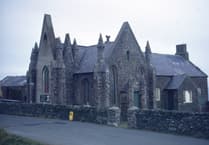People are being warned about the consequences and dangers of unlicensed burning of registered heath, after a local man was prosecuted.
This week’s Manx Independent covers the case of Henry Joseph Bridson, from Dalby, who admitted setting fire to an area of registered heathland, without a licence.
Bridson was the first person to be prosecuted under the Heath Burning Act 2003.
Under the legislation a licence must be obtained from the government to burn or destroy registered heath.
Registered heath covers around 12% of the island and is characterised by low growing shrubs such as heather, blaeberry and western gorse.
The Isle of Man was the first jurisdiction in the British Isles to regulate prescribed burning by way of licensing and the maximum fine for burning or destroying registered heath without one is £10,000.
Martyn Perkins MHK, political member for Environment, Food and Agriculture, said: ’Our upland heath provides valuable and internationally significant habitat for a variety of threatened and endangered species such as breeding hen harrier and curlew.
’Upland peat soils are also the island’s largest carbon store and this important resource can be damaged by inappropriate burning. This prosecution is the first relating to this legislation and sends out an important message about the importance of protecting our Biosphere.’
Anyone wishing to carry out prescribed burning should first contact DEFA to apply for a licence and can do so by calling 695701 or by emailing [email protected].
Kevin Groom, chief fire officer, said: ’Licensed burning can only be carried out at the right time of year and with safety precautions in place to avoid unnecessary risks. If anyone is planning such work and has a licence they should follow the advice given in the Heath Burning Code to ensure that all relevant authorities are fully aware of the details at the location.
’A poorly planned or ill prepared approach to prescribed burning can quickly get out of control and endanger people, wildlife and the environment. Additionally, a developing heathland fire can very quickly cause an impact upon the limited staff and resources of the fire service.’


.jpeg?width=209&height=140&crop=209:145,smart&quality=75)

